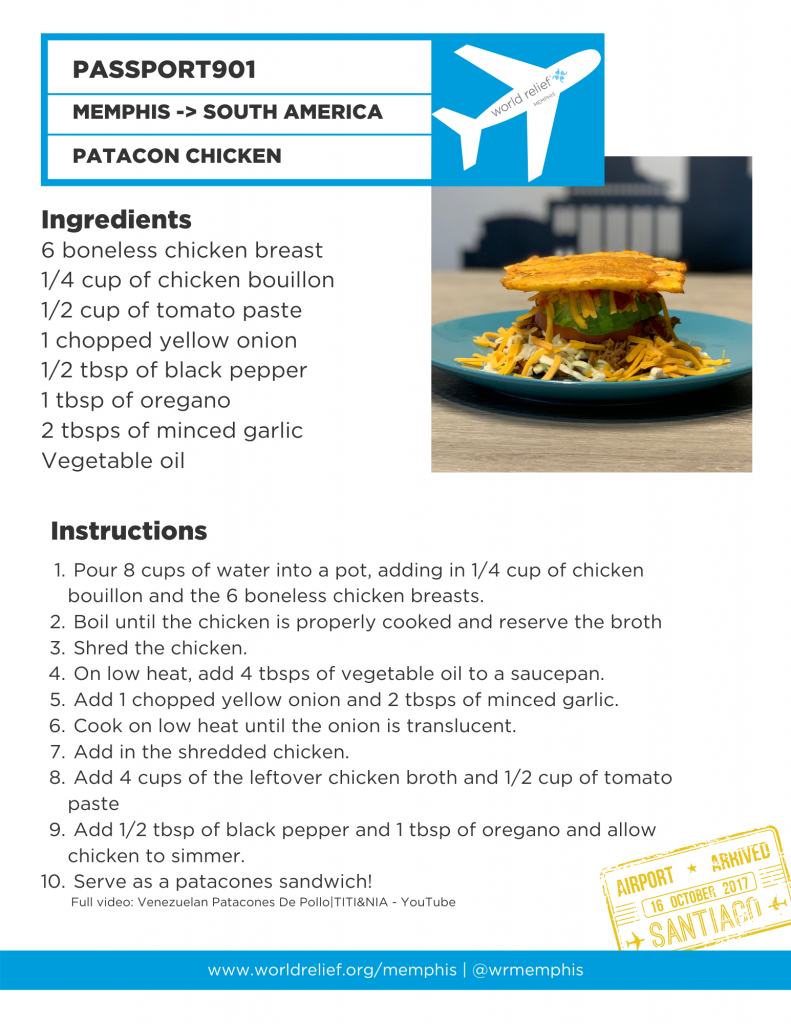Posts Tagged ‘Memphis’
Facing big dreams: American citizenship makes them reality
This summer, our interns attended an ethical storytelling workshop in partnership with the University of Mississippi and Southern Foodways Alliance. To learn the ropes of the industry, they were tasked with interviewing immigrants within their community. Mobilization intern Peace spoke with Chisom about what being an American would mean to her.
A new normal
Growing up in Lagos, Nigeria, Chisom dreamt of leaving her home to go study abroad anywhere in the world, including the United States. “It was never a realistic dream,” She explained. “It was just something my parents mentioned a few times but was never something that was definite.” On March 30, 2017, Chisom and her family relocated to the United States, making her dreams come true right before her eyes.
She recounted the details of her journey to the U.S. with many emotions and smiles, even if the journey wasn’t a smooth one.
“It was a terrible experience because we were scared. At the place where they check your bags for contraband, the family in front of us, they checked their bags, and I don’t know what they found,” said Chisom, who is now 17 years old. “I don’t remember the situation at all, but they got deported back to the country—all five or six of them. They had huge bags, and we had a lot of stuff. It wasn’t a nice sight, honestly.”
Chisom eventually found a rhythm as her life found its new normal. She started high school and started to get accustomed to their curriculum, but her new normal was not without a few culture shocks.
“There are so many differences that I could write a whole book. Free public-school education was a huge difference. Even back in my country, they may have had ‘free’ public school education, but it wasn’t,” she said. “Here [in the U.S.], we have free public-school education where you’re given a free Chromebook to use throughout the school year, and you are given textbooks to use, and all you need to do is check it out. You don’t have to pay any amounts except if you lose it.”
On top of the differences in schooling, she also had to adjust to new standards of living.
“Anytime I think about it, I would always ask myself ‘How did I do this?’ There was never constant electricity back home. I feel it is all about adaptation because we were born into it,” Chisom explained.
The American dream
When asked about the reasoning behind her parents’ decision to migrate to the United States, she stated that it was simply the American dream.
“The American dream is what sold them, that when you come to America, you have a better life, and you have more opportunities for a better life, you get to explore more aspects of your life,” she said. “I think that is what pushed them to bring I and my sister to this country: to have opportunities that they didn’t have.”
In February 2020, Chisom found her life taking a turn for good when she got her legal permanent resident status, which meant that she was officially a green card holder and could apply for citizenship in the near future.
After stating that she is very happy about the turn of events in her life, she began to explain what a U.S. citizenship meant to her.
“America is known as the land of the free and the land of opportunities. Being a citizen means that I will be given the freedom to explore and utilize these many opportunities. I have been able to apply for scholarships that are only given to U.S. citizens, even as a legal permanent resident.”
Chisom, 18
One of those newfound freedoms would be helping to make decisions for her new country: “I think being a U.S. citizen entails knowing the constitution, knowing the privileges you have when you become a citizen, like voting. So, that would mean that I would partake in huge decisions of choosing leaders for my community, my state, or even in the country at large.”
She also spoke about the benefits of being able to travel to places like Austria, Qatar, Ukraine, and countries that don’t require a visa when you have your U.S. passport.
“This opportunity will help me explore many places while expanding my knowledge on how the healthcare system works in various places, preparing me for my career as a doctor,” she says.
Turning dreams into reality
Like many immigrant children, Chisom is not afraid to face her big dreams. She has dreamt of being a doctor since she was little and cannot see herself doing anything else.
Chisom graduated from high school in May and will be continuing her education at the University of North Georgia in the fall as she works towards her goal. She stated that the opportunities that a U.S. citizenship offers will help her achieve her dream of helping underserved communities and, hopefully, to help better the healthcare system of her homeland, Nigeria.
“Being a U.S. citizen is definitely going to help me achieve that. If I decide to build a hospital, I am pretty sure there’s paperwork and things that require my citizenship—maybe to have land rights and other things,” Chisom said.
The conditions of the healthcare system of Nigeria continue to be the driving force of her motivation to become a doctor. “I saw a video of them giving the COVID-19 vaccine, and the environment was not good at all. I almost cried,” she said.
Even without COVID, other problems still exist within their healthcare system such as self-diagnosis. “You feel weak, and all of a sudden it’s ‘malaria.’ You start taking malaria drugs every day, but it never occurs to them that they might have some other underlying problems,” she explained. “That is the sad reality.”
While Chisom continues to worry for her home country, she believes that her dreams can be achieved when she becomes a U.S. citizen, and she is grateful for the opportunity.
Peace joined the Mobilization Department as an intern in Spring 2021. She’s currently a sophomore at Rhodes University studying biology.
I helped U.S. troops in Afghanistan. I’m safe now, but I worry for friends I left behind.
Program participant Seeta Habib and her family were resettled in Memphis in October 2020 through the special immigrant visa program. She and her husband had served as interpreters and journalists for U.S. forces in their home country, and they were consequently targeted by the Taliban. This is her story.
When the Taliban took power in Afghanistan in 1996, millions of Afghan girls were shut out of school. I was one of them.
It wasn’t until the eventual defeat of the Taliban government in 2001, when I was 13 years old, that I entered a school for the first time in five years.
It was one of the happiest days of my life, but it was still a dangerous time to be a girl in Afghanistan, seeking an education. I learned English secretly, in a private class outside of school, and when I graduated, I knew I wanted to be a part of Afghanistan’s reconstruction. I became a print journalist for a magazine operated by NATO’s security mission in Afghanistan, the U.S.-led International Security Assistance Force in Farah, in the western part of Afghanistan. There, I covered ISAF activities having a positive impact in the community.
Passport901: Chapli Kabab
As part of Immigrant Heritage Month in June, we partnered up with Choose901 to bring you #Passport901. Throughout the month, we shared recipes from around the world that represent the diverse groups and cultures that have come to call Memphis home. Now, we’re continuing it through the month of July, and today we have a Pakistani dish from one of our program participant’s, Saima.
For the final installment of Passport901, we’re bringing you Chapli Kababs from Pakistan. This dish originally comes from the Khyber Pakhtunkhwa province, and it is a popular street food that can be found from Afghanistan, to Pakistan, to India and Bangladesh.
Although this recipe calls for beef, it can also be made with chicken and lamb. You’ll find the full recipe below, or you can follow along with Saima’s video here.
Once you’ve made your kababs, be sure to share a photo on social media, tagging us and Choose901 in it with #Passport901 for a chance to win a prize from all of us!
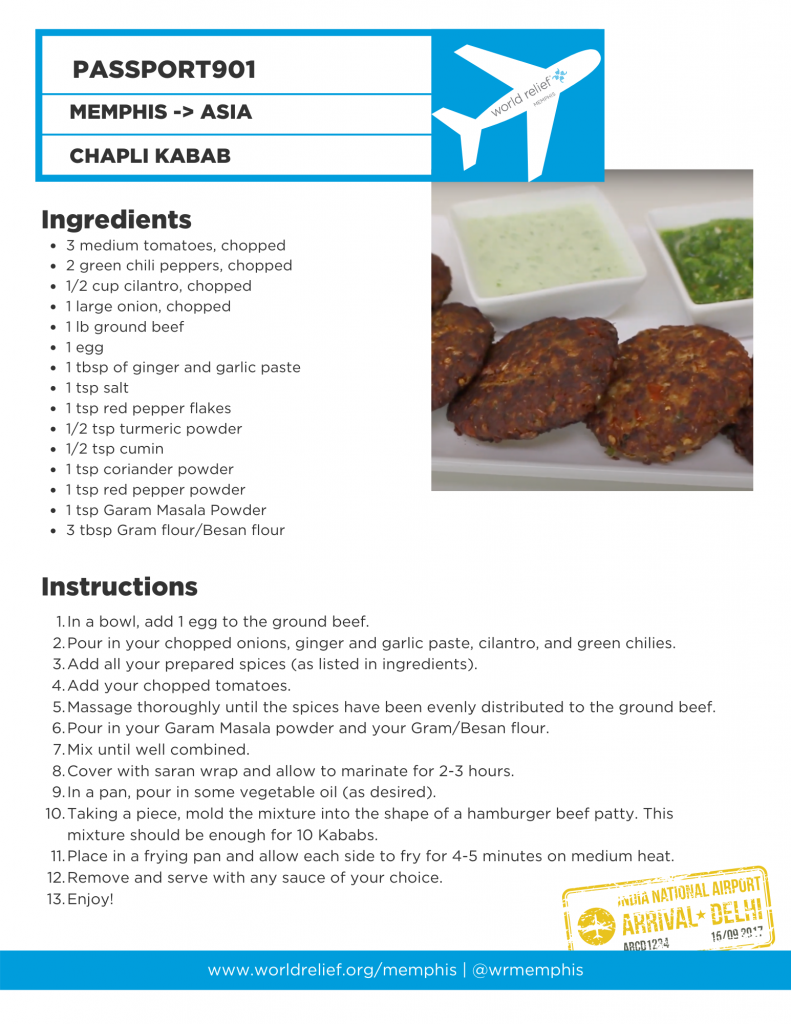
Passport901: Maqluba
As part of Immigrant Heritage Month in June, we partnered up with Choose901 to bring you #Passport901. Throughout the month, we shared recipes from around the world that represent the diverse groups and cultures that have come to call Memphis home. Now, we’re continuing it through the month of July, and first up is a dish from the Middle-East brought to you by our co-worker, Laura Neal.
One of the most popular dishes in the Arab world is Maqluba. It comes from the Arabic word that means to turn upside down, and it is a very literal name. The tradition of the dish supposedly came from a small, poor Palestinian village a long time ago. The people were very hungry and had very little, and the local Iman wanted to help them. He brought a large pot out and asked everyone to bring their leftovers and what ever they had and put it into the pot. They brought many different things, layered them in the pot, then the Iman cooked it all together. Lastly, he flipped the pot over onto a tray, hence the name, and they had a great feast. This dish ties very cohesively into the important tenants of hospitality and charity that is so important in Arab culture. It is most traditionally eaten off of the communal platter with either spoons or with your hands.
It is a simple but time consuming dish to make because of how many steps there are. Put all the ground spices in a bowl. You will use this to make a broth, but reserve a tablespoon. Put the chicken, onion, spices, cloves, and bay leaves in a large pot and cover with water for about 30 minutes. When the chicken is cooked, remove it, pour the broth through a sieve and keep it. While the broth is cooking you fry the vegetables in batches as to not over crowd them. (You can use whatever vegetables you like. This version has cauliflower and carrots, but it also often has potatoes.) The vegetables do not need to be fully cooked, but fried just until they have color on them. You can place them on a paper towel to drain the excess oil from them. Then after the chicken is cooked, you fry the chicken! Next you coat the bottom of the pan in oil and put the chicken and whole garlic cloves in the bottom of the pot, put the fried vegetables on top. Rinse the rice until the water runs clear and drain it. Mix the remaining spices and a teaspoon and a half of salt in the rice. Then put the rice over the vegetables and chicken. Lastly you pour the previously made broth over it all. Make sure there is about a quarter of an inch of broth above the rice, you may need to add more water. Cover it and cook on medium heat it until the rice is done, about 20 minutes. Maqluba means something that is flipped over, so to serve it, you flip the whole pot onto a tray and serve it with the chicken on top. You eat it with yogurt on the rice and a cucumber tomato salad on the side.

Step 1. Place the spices and chicken in a pot. 
Step 2: Boil the chicken and make a broth 
Step 3: Fry the vegetables 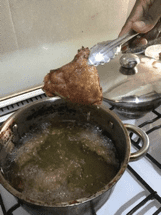
Step 4: Fry the chicken 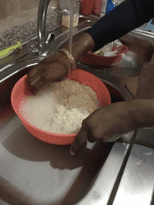
Step 5: Rinse the rice 
Step 6: Layer chicken and garlic on the bottom of the pot, then the vegetables on top. 
Step 7: Season the rice and place it in the pot on top of the chicken and vegetables 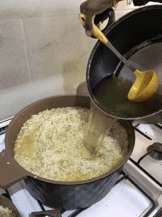
Step 8: Strain the broth previously made, then pour it over the rice 
Step 9: Cook until the rice is done, then flip it over onto a platter. Enjoy!
And that’s it! Now you have your very own Maqluba to enjoy with family and friends. When you do, don’t forget to share a photo to social media and tag us and Choose901 in it for a chance to win a prize from both of us!
For a printable version of the recipe, download the recipe card below.
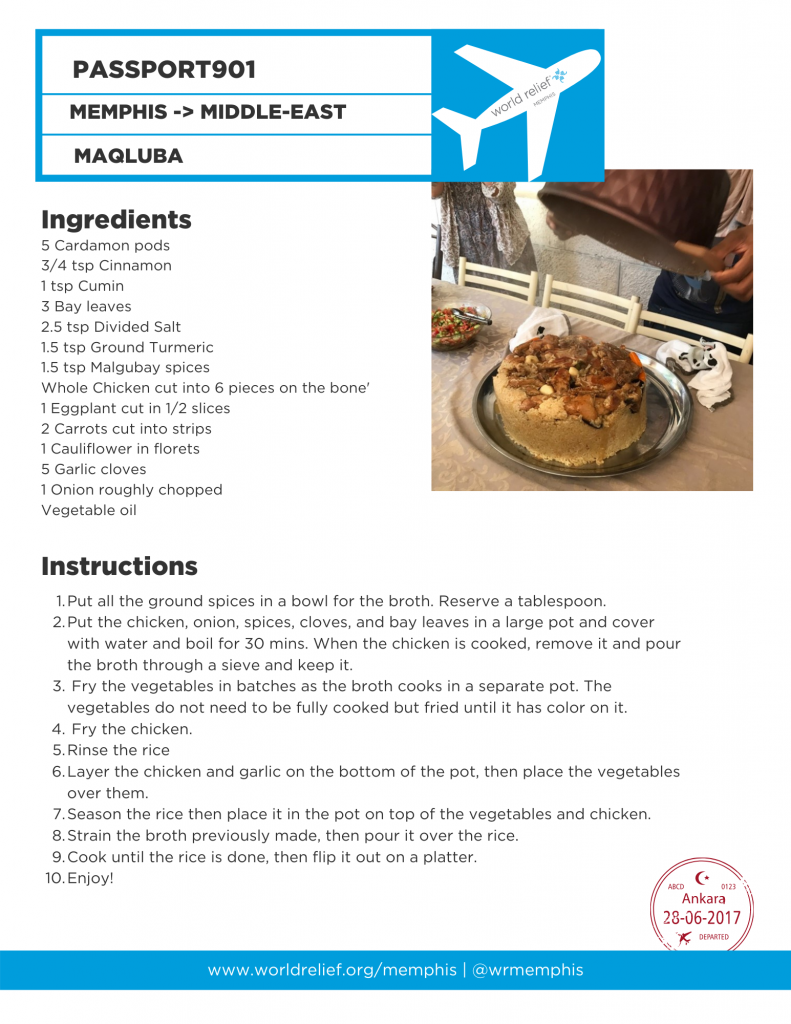
Laura is the ERA Coordinator at World Relief Memphis. She previously lived in the Middle East for 3 years. Her favorite way to learn Arabic was taking cooking classes in Arabic! She loves culture and appreciates the different ways people celebrate where they came from and what God has given them. We see so much diversity in creation and culture and that can be appreciated and experienced through cooking and eating different foods!
Let’s talk about immigration: 8 Podcasts to know
This month, we’re celebrating Immigrant Heritage and World Refugee Day, and we have compiled a list of podcast episodes that discuss the highs and lows of immigrants all over the world to help you get prepared. These podcasts give a first-hand account of life as an immigrant, the circumstances that drove them to seek a better life in another country and how the immigration policies can affect the success of immigrants all over the world.
Listen to the story of how the COVID-19 pandemic affected immigrant life in the United States through the eyes of Joy, an immigrant from China who finds herself in an abusive relationship. Her decision to flee from the situation causes her to rebuild a life with her daughter with little to no help.
Is it ever too late to start over? Learn a new way of life in a new country? Misha is a 24-year-old Pakistani American that moved to the United States in 2003. In this series, she learns to do all the things she never did as an immigrant child. She also learns to find her place in this new world.
Modern Immigrant: Walking from Honduras
Luis migrated to the United States in 1997 at the age of 8. He opens up about the language barrier that he soon overcame, since he was eight years old at the time. In this episode, Luis says that being an immigrant allowed him to be a risk taker, which means that he survived all the battles that he has had to face. He also talks about some of the issues and challenges that are still plaguing the immigrant society such as the hard immigration process, which gives limited freedoms to immigrants due to certain laws.
The Immigrant Show: Joseph from Kenya
You can call this another immigrant success story as Joseph talks about his education and professional journey as an immigrant. Joseph tells how circumstances led him to make the decision to study overseas as it was his only choice. He ventured into STEM and completed his degree, but it wasn’t very easy after that. He lets us know that he was no stranger to failure as many of his attempts to build the future of his dreams proved futile. Listen to learn all about how he achieves his American dream and conquers the biotechnology field.
Modern Immigrant: Craving for Healing – Latinx Therapy
It is not uncommon to hear of people ignoring their emotions and mental health because they cannot afford to share with professionals. The founder of the Latinx Therapy podcast shares her experiences with people who could not afford her services, as they felt that therapy was out of their reach. She also shares her struggles with her own mental health and shares resources for anyone who might need to talk to someone or a support group.
How does one resettle in a different land and keep their culture intact? Listen as Noori shares his journey from Afghanistan to the United States, the conditions that drove him to seek refuge in another country, and how he overcame the obstacles that were thrown his way, and how he has been able to stay connected to his culture.
Neighbors: The Language Learner
Gin Thawng is forced to flee his home country Myanmar, also known as Burma, and seek refuge in the United States due to the civil war. Although he was safe from the war, he was plagued with new problems including medical debt and unemployment. His son was their only source of income. It is not an uncommon occurrence to hear of the language barrier, which caused Gin to sign up for an ESOL class on wheels that was founded by a woman driven to help refugees. He talks about the power of language and the human connection that extends past any language barriers.
Life Across Borders: A World Relief Mini-Series on Apple Podcasts
Last but not least, our own mini-series discusses some of the pressing immigration issues going on the United States today and the steps that the government is taking to address them. There is also a Biblical discussion of immigration and how the church should respond.
Following World Refugee Day, we understand that you may questions around refugees and immigrants, so these are just a few of the podcasts available to help you learn more. This year, we expect to welcome hundreds of neighbors to the Memphis area, but we can’t do it without your help as you’ve seen in the podcast episodes above. If you want to get involved and help welcome our neighbors, head to our volunteer page to see what options are available! Or, consider making a gift towards a new horizon, one where our neighbors our welcome.
Passport901: Vegetable Stew
As part of Immigrant Heritage Month, we’ve partnered up with Choose901 to bring you #Passport901. Throughout the month, we’ll be sharing recipes from around the world that represent the diverse groups and cultures that have come to call Memphis home.
We’ve traveled to the Middle East and Latin America, and now we’re traveling to Central Africa with our #Passport901. We spoke with two young women from the Democratic Republic of Congo and Rwanda about specialities from their home countries, and both agreed that this vegetable stew was a classic.
Yet when making the dish, they explained that it could change every time they prepare it according to “what the spirit tells you.” We’ve provided a rough outline of the ingredients and steps, but feel free to adjust it to your tastes!
Follow along with the video below to learn how to make this dish, and share the end result on social media, being sure to tag us and Choose901 in it with the hashtag #passport901. At the end of the month, you could win a prize that features swag from both of us!
If you want a copy of the recipe to print out, you can use the one below. Or, if you don’t have time to cook this week, check out our volunteer page to see how you can get involved in the coming months as we help welcome our neighbors to the 901.
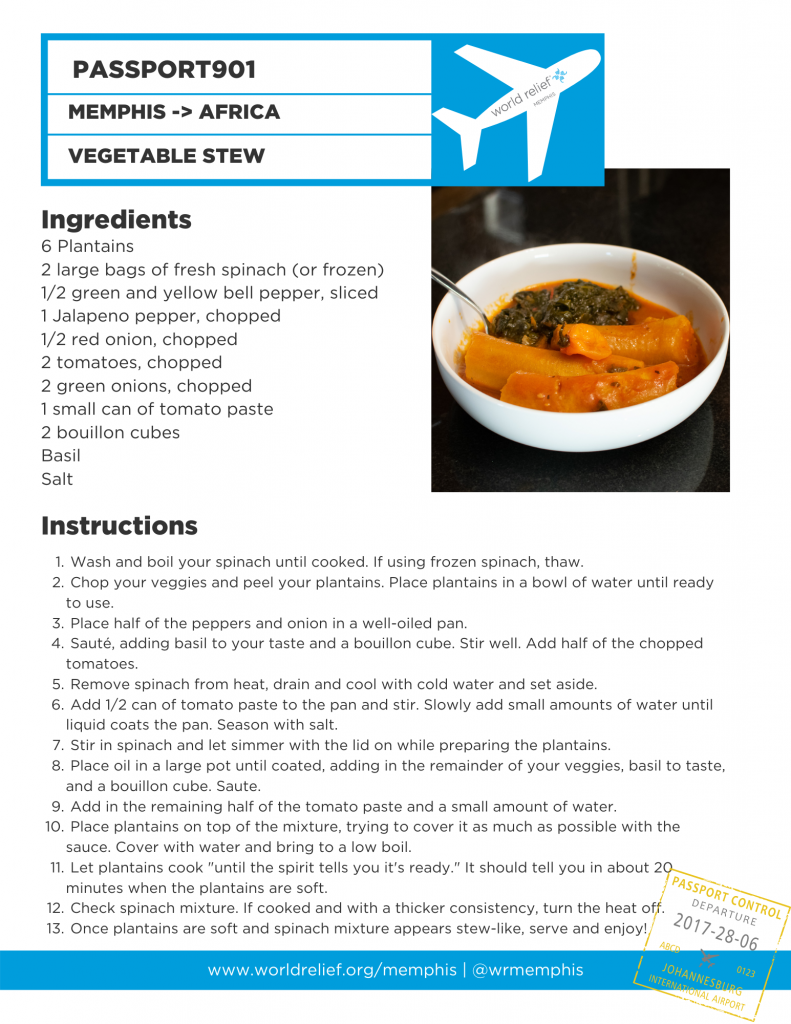
Passport901: Patacon
As part of Immigrant Heritage Month, we’ve partnered up with Choose901 to bring you #Passport901. Throughout the month, we’ll be sharing recipes from around the world that represent the diverse groups and cultures that have come to call Memphis home ahead of World Refugee Day on June 20th.
Our second stop on our global taste tour as part of Immigrant Heritage Month is South America. In Venezuela, a sandwich doesn’t have to necessarily be made with bread. Instead, we can use fried plantains.
At local restaurant Sabor Caribe, this plantain sandwich, or patacon, is a menu staple. They took us behind the scenes of how they make this traditional dish, and we took notes to share it with you as part of #Passport901.
To make this dish at home, you’ll need a pan, vegetable oil and plantains., Once cooked, you can serve it with beef, chicken or veggies and a variety of toppings. You’ll find the full recipe below so that you can print it out and add it to your menu for the week.
Once you’ve made it, be sure to post a photo of it to Instagram or Facebook, tagging us and Choose901 in it with the hashtag #Passport901. When you do, you’ll be entered to win a prize from us and Choose901!
If you don’t have time to cook this week but you want to learn about your neighbors here in Memphis, come to our Behind-the-Scenes event on June 22nd at 7 p.m. Or, help us welcome our newest Memphians to the city through volunteering.
Saima’s Kitchen World
Growing up in Pakistan, Saima never went to school. Her family did not have internet access, so she spent her days cooking alongside her mom, preparing dishes ranging from the Afghan classic bolani to the Pakistani biryani.
Over time, she began to try different recipes that were less familiar to her and her culture—ice cream, fish sticks and lasagna. Cooking passed the time as they waited to be relocated to the U.S. after having fled terrorism in their home country of Afghanistan.
Yet when she came to the United States in 2016 with her mother, brother and sister, Saima saw a window of opportunity that had not previously been there when she discovered YouTube for the first time.
“She watches a lot of YouTube videos, and she saw that everybody posts their cooking videos, and she said ‘Why shouldn’t I?’” said her sister, who interpreted for Saima. “She loves cooking, so she posts her videos, and, hopefully, if her videos get monetized, she could earn from YouTube too.”
In their home country, Saima and her sister would never have dreamed of this possibility.
“When we moved here, I can’t imagine—back in my country I couldn’t work because it’s very hard for girls to work over there,” her sister said. “But here, I went to college; I work over here; Saima works over here. It’s much better, and of course there’s no terrorism.”
With these new doors opening, both sisters saw new futures for themselves—one in the medical field, and Saima in communications. While her sister worked and went to school, Saima worked as well, but she also taught herself everything she needed to know for her cooking channel with the help of her brother, who first introduced her to video editing.
“Now, she does it herself. She just goes into the system and finds new things,” her sister said. “There are a lot of things I don’t know how to do, but she does. She’s creative, very, very creative. I don’t know much about computers, but she does, even though she’s never been to school.”
If you look on Saima’s Kitchen World today, you’ll find dozens of videos that reflect her and her family’s story: their flight from Afghanistan, the wait in Pakistan and finally their arrival in Memphis. Despite having only tried pizza in the U.S., Saima is sure to pay homage to her adopted home with recipes such as club sandwiches.
One day, she hopes to take her cooking to the next level with paid sponsorships and eventually a cookbook after learning English and studying communications. With the help of her family, this new dream seems closer than ever.
“We get things ready for her, and she cooks it on the weekends. The other days, when she comes back from work at night time, she’ll do editing and stuff. The next week she’ll upload the video on the same weekend that she makes a new recipe,” her sister explained for Saima. “It’s very hard and time consuming. It is nonstop.”
It may be time-consuming, but it’s a labor of love that Saima is happy to continue. While waiting for her debut as a cookbook author, you can find her mastering recipes for family and friends, both American and immigrant alike.
If you want to travel around the world through cooking like Saima has done, join us this month for #Passport901 in celebration of Immigrant Heritage Month! Each week we’ll post a new recipe to try, starting with Saima’s, and by cooking it you could be entered for a chance to win a prize in partnership with Choose901. Simply post the end result to your social media account, tagging us in it and using #Passport901. The winner will be announced at the end of the month.
If you don’t have time to whip up a recipe amidst the summer holidays, fill out a volunteer application to see how else you can get involved.
Passport901: Nankhatai
If you’ve been following along on our social media, you know that this month we’re launching #Passport901 in partnership with Choose901 to celebrate Immigrant Heritage Month.
Throughout the month, we’ll be traveling around the globe through various recipes provided by staff, clients and community partners.
The first stop on our list this month is the Middle-East. Today, we’ll be making Nankhatai, a traditional dessert often served with tea. One of our former program participants shared a video on her blog Saima’s Kitchen World detailing how to make it with a step-by-step tutorial.
If you’d rather follow along with printed instructions, download the recipe card below and follow along at home.
Once you’ve finished your Nankhatai, share a photo on Facebook or Instagram, tagging us in it at @wrmemphis and using the hashtag #Passport901. For each post to your feed or story, you’ll be eligible to win a prize at the end of the month featuring gear from us and Choose901!
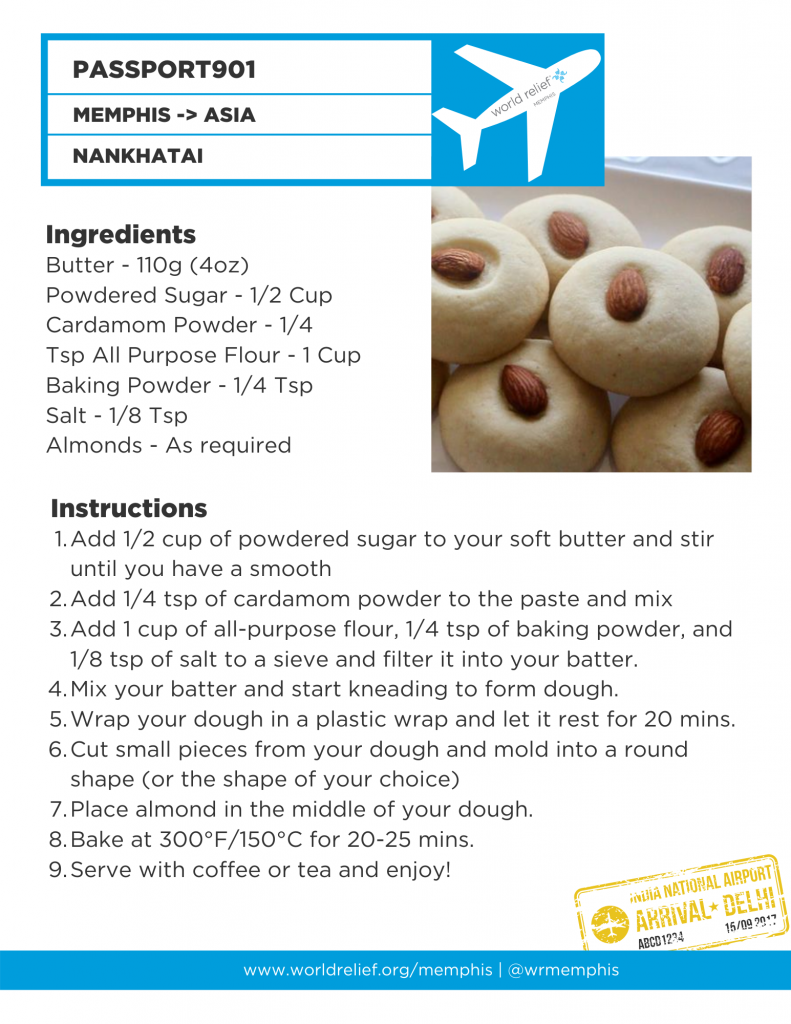
If you can’t join us in Passport901 this month amongst your summer travels, consider contributing towards a new horizon or joining us as a volunteer.
One of the Lucky Ones
On September 28, 2016, Alphonse and his sister were welcomed to the United States by World Relief Memphis staff and volunteers eager to help. Just a few months later, the number of refugees to be admitted to the United States was drastically cut.
In the span of a few months, people’s hopes and dreams of rebuilding a life in the U.S., safe from harm, were dashed. Alphonse, however, was one of the lucky ones.
“I thought ‘Wow’ because I know most people always dream to come to the US,” said Alphonse, 24. “I just realized that I’m one of the lucky ones, and I’m here.”
Alphonse was born in the Democratic Republic of Congo, but, at only two months old, he went to a refugee camp in Tanzania with his father. When his father died, he returned to the DRC, but the situation had not improved, and he moved to a new camp in Malawi with his sister.
“There were still robbers coming to break down the house, still the same thing happening with people getting killed,” Alphonse explained. “It was really hard, so my mom decided to tell me to move to the refugee camp in Malawi with my sister.”
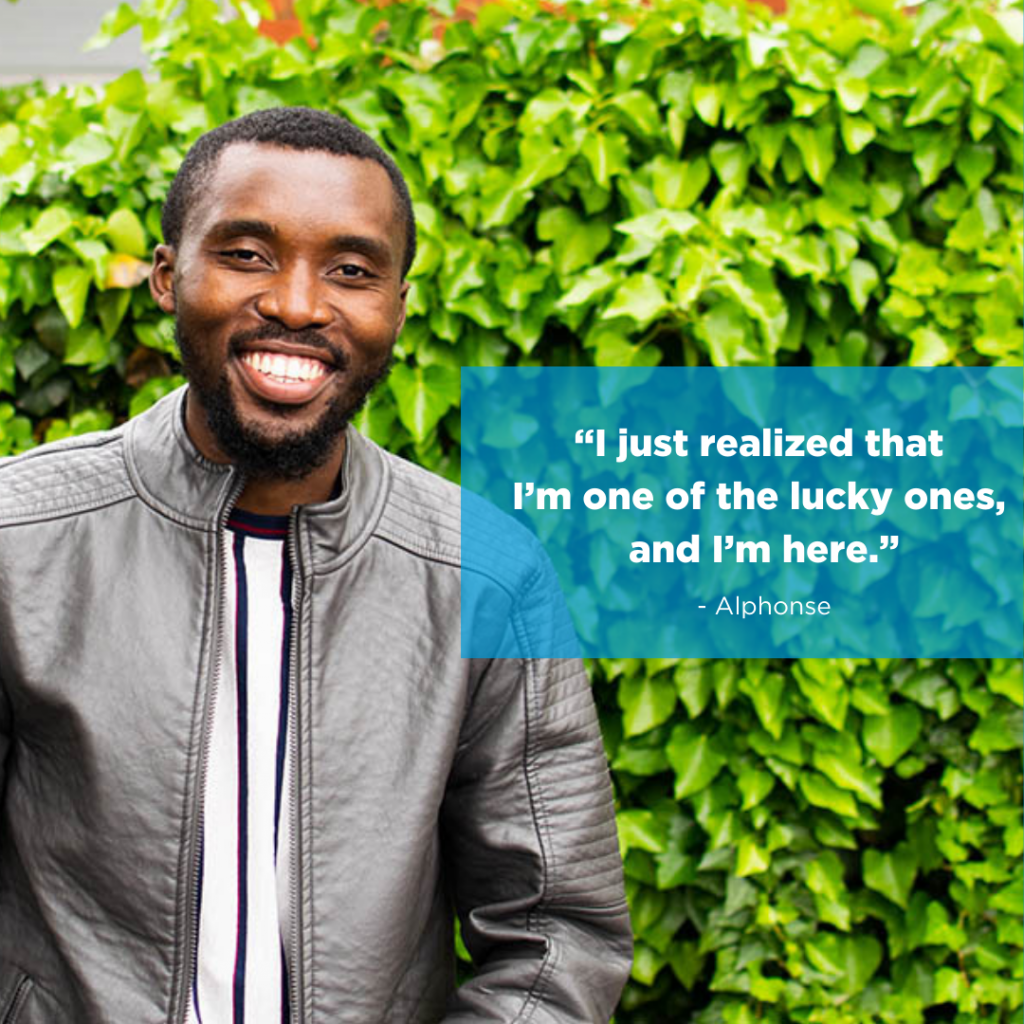
For the next thirteen years, he and his sister waited for news of their visa. As time passed, Alphonse dreamed of America—Los Angeles, New York, Chicago—but he never expected Memphis. When they were told they were moving here, the dream began to solidify into reality as he researched his new home.
From day one, Alphonse began learning how to navigate his new life. However, he was never alone as he might have imagined before. Instead, he had a family of volunteers, World Relief Memphis staff and fellow immigrants there to help him.
“World relief was one of the organizations that helped me make more friends with volunteers,” Alphonse said. “They drove me around, took me out, [encouraged me to] try and move forward, and start looking for jobs. I found my first job.”
With their help, Alphonse began to wade through the culture shock of a new country and language to become an entrepreneur and leader in his own community.
“When somebody leaves their stuff to come help you out, it’s really showing love, because not everybody can do that,” said Alphonse, referring to World Relief Memphis and his team of volunteers. “To see that passion of helping people out, why not support that? You want to see the world as a beautiful place; it is something that you want to put yourself and get into.”
With that thought in mind, Alphonse is doing everything in his power to take care of his community, in particular the youth and the elderly, through his cleaning business and job readiness trainings.
“It’s hard for them because most of them are old, and learning English is not easy for them,” said Alphonse, who would like to run the program in partnership with World Relief Memphis. “I started having the idea that once they first arrive in the United States, showing them how to do things like ‘This is where you have to put your name, your address, your phone number, etc.’”
From there, his hope is that they would then find employment within the city, or perhaps even in his own entrepreneurial endeavors. When not pursuing his degree in Computer Information Systems or working, Alphonse can be found working on his own business cleaning and disinfecting offices.
“We have other people in the community where—they have disability problems where they cant work. Some of them they just feel like they need something simple,” Alphonse said. “I started thinking about coming up with something that might make them feel like they’re doing something, even if it is that little. They know that they have something that gives them a little source of income to support themselves beside having assistance from the government.”
As his business grows, he plans to begin hiring within his community. Yet for the moment, he is focusing on his studies despite the challenges that arrive, such as a pandemic, so that he can in turn focus on his family.
“Life is surprising me every day. It’s getting more surprising every day,” Alphonse said with a chuckle. “I really want to work hard. I want to change my family story. I want to see myself doing something different.”
Coming from a family of doctors and nurses, Alphonse still plans on helping others and giving back to the community, but not in the way that they would expect because of his chosen career field in technology.
“I know technology is one thing back home people still struggle with, so even when I go back I can still be that person [who] bring[s] new changes in the community, in the village, in the society, where people can start knowing things,” Alphonse said.
When he arrived nearly five years ago, he had never dreamed of this new possibility. At the time, his dream was simply to come to the United States. Looking back, Alphonse knows it wasn’t fate or a coincidence, but rather God’s perfect timing.
“I can say everything that has happened to me is God’s hand upon my life,” Alphonse said. “God is really doing amazing things. I can say to start a business and do school while working, it’s not like I’m controlling it. God is helping me every day to keep going, pushing.”
Perhaps one day soon, Alphonse will be helping other refugees realize similar dreams as they begin to arrive in the United States under the increased refugee ceiling. For now, he’ll continue forging ahead to achieve his own and pave the path for others that come after him.
“People just have to keep trying because sometimes, life gives us a different picture than what we think life looks like. But at the end of the day, whatever comes your way, it’s for your own sake and it’s going to be better—somehow, some way,” Alphonse said. “It’s just good to keep trying. That’s how I always do.”
If you want to be a part in helping refugees and immigrants such as Alphonse rebuild their lives and achieve their dreams here in the United States, head to our ReBuild page to see just how you can do so.
To Alphonse, we are so thankful that we were able to be a part of your journey as you arrived in the U.S., and we are incredibly proud of all that you have done. We cannot wait to see what the future holds.








